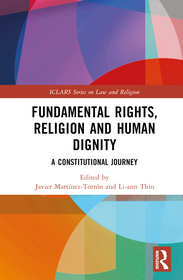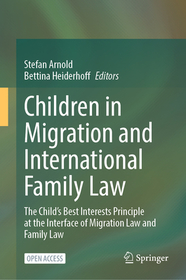
Artificial Intelligence and International Human Rights Law
Developing Standards for a Changing World
- Publisher's listprice GBP 129.00
-
61 629 Ft (58 695 Ft + 5% VAT)
The price is estimated because at the time of ordering we do not know what conversion rates will apply to HUF / product currency when the book arrives. In case HUF is weaker, the price increases slightly, in case HUF is stronger, the price goes lower slightly.
- Discount 10% (cc. 6 163 Ft off)
- Discounted price 55 467 Ft (52 826 Ft + 5% VAT)
Subcribe now and take benefit of a favourable price.
Subscribe
61 629 Ft

Availability
Estimated delivery time: In stock at the publisher, but not at Prospero's office. Delivery time approx. 3-5 weeks.
Not in stock at Prospero.
Why don't you give exact delivery time?
Delivery time is estimated on our previous experiences. We give estimations only, because we order from outside Hungary, and the delivery time mainly depends on how quickly the publisher supplies the book. Faster or slower deliveries both happen, but we do our best to supply as quickly as possible.
Product details:
- Publisher Edward Elgar Publishing
- Date of Publication 11 October 2024
- ISBN 9781035337927
- Binding Hardback
- No. of pages346 pages
- Size 234x156 mm
- Language English 713
Categories
Long description:
This book explores how international organizations have addressed the actual and potential human rights issues caused by AI technologies. Combining in-depth theoretical and doctrinal analysis with a pragmatic approach, it investigates vital questions on where accountability and responsibility for AI-related violations of human rights should lie.
Expert contributors examine the evolution, strengths, weaknesses and loopholes of international guidelines and standard-setting initiatives for AI by the United Nations, Council of Europe and European Union. Chapters focus on key situations in which the use of AI raises human rights concerns, including AI-supported decision-making in healthcare, public administration and cases of asylum; the use of facial recognition software; and the creation of deepfakes. Ultimately, the book highlights the need to establish effective oversight systems and adaptable remedies to protect human rights as AI continues to develop.
Demonstrating the significant implications of AI technology in all areas of human life, this book is a vital resource for academics and students of international human rights law and European law. It is also an important read for policymakers and professionals interested in data security and the utilization of AI-powered solutions.
This is an open access title available under the terms of a CC BY-NC-ND 4.0 License. It is free to read, download and share on Elgaronline.com.
The open access publication has been financially supported by Nicolaus Copernicus University in Toruń as part of the research project: “Freedom or Security? Legal and Ethical Dilemmas of New Digital Technologies - the Perspective of International Human Rights Law and Security Policies” (IDUB grant, “Inter disciplinas excellentia”)
This book explores how international organizations have addressed the actual and potential human rights issues caused by AI technologies. Combining in-depth theoretical and doctrinal analysis with a pragmatic approach, it addresses vital questions on where accountability and responsibility for AI-related violations of human rights should lie.
‘In summary, Artificial Intelligence and International Human Rights Law offers a useful roadmap for understanding the evolving international legal landscape surrounding AI. The book effectively addresses the complexities of AI’s impact on human rights and provides practical recommendations for ensuring that AI development aligns with the principles of democracy, the rule of law and human dignity. Through its examination of the UN, CoE and EU’s regulatory efforts, the book equips organisations with the tools needed to navigate international guidelines and contribute to the development of fair and ethical AI systems. Its relevance to a global audience makes it a crucial resource for anyone engaged in AI policy, law and ethics.’
Table of Contents:
Contents
List of contributors vii
Foreword xii
Gabriela Ramos
Introduction: AI and international human rights law 1
Michał Balcerzak and Julia Kapelańska-Pręgowska
PART I EFFORTS OF INTERNATIONAL ORGANIZATIONS
1 Implications of the United Nations human rights standards
for the development of artificial intelligence 6
Michał Balcerzak
2 Council of Europe standards and activities related to AI:
towards a Framework Convention on AI and human rights? 25
Elżbieta Hanna Morawska
3 Navigating the AI landscape in the EU: fostering
innovation while upholding ethical principles 45
Piotr Staszczyk
PART II AI AND HUMAN RIGHTS: SPECIFIC ISSUES
AND WAYS TO ADDRESS THEM
4 A rights-based approach to automated decision-making in
the public sector 69
Marya Akhtar and Rikke Frank J¿rgensen
5 Pegasus contra democratic process: experience from Europe 86
Agnieszka Bień-Kacała
6 AI in healthcare and biomedical sciences: the need for
human rights impact assessment 103
Julia Kapelańska-Pręgowska, Emilia Sarnacka and
Katarzyna Syroka-Marczewska
7 European Union data protection law and the use of facial
recognition technology for the purpose of fighting crime 124
Joanna Mazur and Zuzanna Choińska
8 Deepfakes: new challenges for law and democracy 145
Ewa Michałkiewicz-Kądziela
9 The evolution of copyright in the age of artificial
intelligence: challenges and perspectives 158
Ewa Milczarek
10 Enhancing human rights accountability of algorithmic
media: an African perspective on inclusive regulation 171
Anne Oloo
11 Artificial intelligence and the right to an effective remedy 196
Maria O’Sullivan
12 Work-related human rights and artificial intelligence 214
Joanna Rezmer
13 Protection of consumers against abuse of artificial
intelligence in electronic trade: the scalper bots case 231
Maciej Jerzy Siwicki
14 Artificial intelligence and the right to a fair trial 250
Tomasz Sroka
15 Artificial intelligence and international humanitarian law
in the work of the parties to the Conventional Weapons
Convention: lethal autonomous weapons 278
Agnieszka Szpak
16 Exploring the challenges of artificial intelligence in
refugee status determination: a human rights approach 294
Lutiana Valadares Fernandes Barbosa and
Ana Lu’sa Zago de Moraes
17 AI in court: the promotion and regulation of information
technology in China’s Smart Court movements 309
Peng Wang and Guannan Qu









